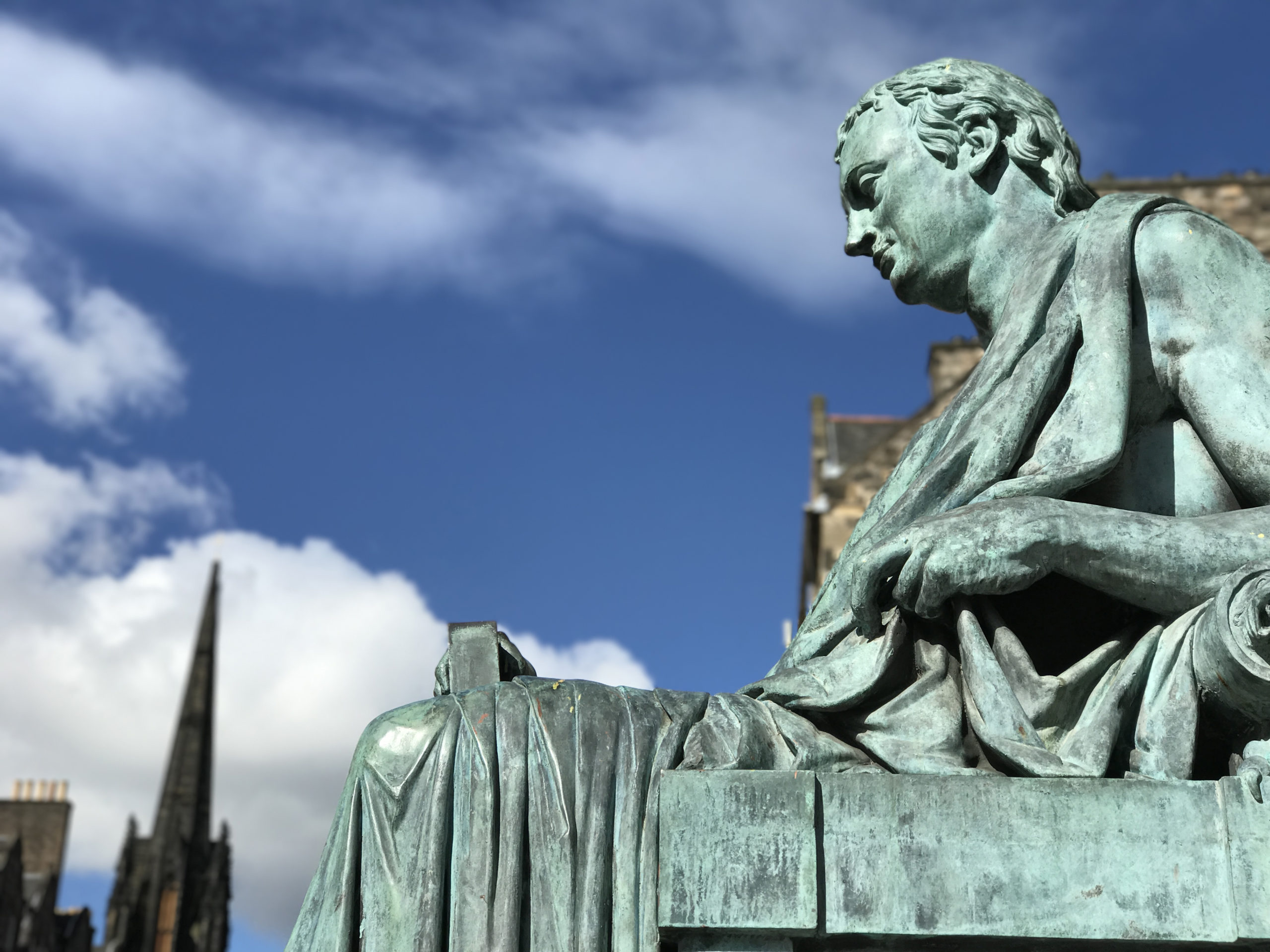
The longest essay in the modern edition of David Hume’s Essays is “Of the Populousness of Ancient Nations,” first published in 1752. The essay aims to discomfort those who lionize the ancients of Greece and Rome, by arguing, in effect, that neither had succeeded in establishing a political order that truly achieved what we today would call the rule of law. That is a mark of “every wise, just, and mild government” (382). The moderns have succeeded better, somehow.
The establishment of the rule of law in an extensive territory would bring prosperity, and prosperity would be reflected in populousness. Thus, Hume uses populousness to assess the ancient world. He argues that ancient Greece and Rome were much less populous than many like to think, and, thus, less prosperous, and less glorious.
Hume proceeds through a number of major aspects of the empirical question of populousness, highlighting the violence, capriciousness, and brutality of ancient society. The first is slavery. He explains why it is wholly detrimental to populousness, and, indeed, this section of the essay (pp. 383-397) is nothing short of an excoriation of slavery.
Next, Hume writes about infanticide and of the “great” families, which he presents as a sort of cult (398), with practices by no means conducive to the raising up of large families.
Next he turns to the “political customs” (400) and “political maxims and institutions” (404), treating a number of facets, including war and revolution. These too, he says, should make us skeptical about claims of ancient prosperity and populousness. About ancient revolutions, Hume writes:
In ancient history, we may always observe, where one party prevailed, whether the nobles or people (for I can observe no difference in this respect) that they immediately butchered all of the opposite party who fell into their hands, and banished such as had been so fortunate as to escape their fury. No form of process, no law, no trial, no pardon. A fourth, a third, perhaps near half of the city was slaughtered, or expelled, every revolution; and the exiles always joined foreign enemies, and did all the mischief possible to their fellow-citizens; till fortune put it in their power to take full revenge by a new revolution. And as these were frequent in such violent governments, the disorder, diffidence, jealousy, enmity, which must prevail, are not easy for us to imagine in this age of the world.
There are only two revolutions I can recollect in ancient history, which passed without great severity, and great effusion of blood in massacres and assassinations, namely, the restoration of the Athenian Democracy by Thrasybulus, and the subduing of the Roman republic by Cæsar. We learn from ancient history, that Thrasybulus passed a general amnesty for all past offences; and first introduced that word, as well as practice, into Greece. It appears, however, from many orations of Lysias, that the chief, and even some of the subaltern offenders, in the preceding tyranny, were tried, and capitally punished. And as to Cæsar’s clemency, though much celebrated, it would not gain great applause in the present age. He butchered, for instance, all Cato’s senate, when he became master of Utica; and these, we may readily believe, were not the most worthless of the party. All those who had borne arms against that usurper, were attainted; and, by Hirtius’s law, declared incapable of all public offices.
These people were extremely fond of liberty; but seem not to have understood it very well. When the thirty tyrants [a pro-Spartan oligarchy installed in Athens after its defeat in the Peloponnesian War in 404 BC] first established their dominion at Athens, they began with seizing all the sycophants and informers, who had been so troublesome during the Democracy, and putting them to death by an arbitrary sentence and execution. Every man, says Sallust and Lysias, was rejoiced at these punishments; not considering, that liberty was from that moment annihilated. (407-408)
Hume goes on to address the security of life and property and the attitudes toward and extent of commerce and trade. He throws salt on ancient accounts that have suggested great populousness, and highlights other ancient remarks suggesting otherwise.
Happiness, prosperity, and populousness depend on the rule of law. Let us hope that it will be there for our grandchildren’s grandchildren to enjoy.


READER COMMENTS
Garrett
Feb 7 2021 at 10:54am
Wouldn’t China be a pretty strong counter example that populousness predicts rule of law?
Daniel Klein
Feb 7 2021 at 12:18pm
I guess the core idea is the rule of law predicts populousness.
If ancient Greece and Rome weren’t that populous, that reflects the unenviable level of rule of law colorfully described.
John Alcorn
Feb 7 2021 at 6:11pm
Thank you for showcasing Hume’s essay. Hume is resourceful in his estimates of ancient population — combining a survey of primary sources (ancient mentions of population, army size, and other indirect evidence) and careful analysis of institutional incentives and cultural practices around fertility.
Hume has been vindicated by historians, who now estimate that the population in the Latin West was roughly 25 million at the time of Augustus and roughly 125 million in 1750.
Daniel Klein
Feb 8 2021 at 9:09am
That’s interesting to hear, John. Thanks.
Thomas Hutcheson
Feb 7 2021 at 9:16pm
I’d never run cross the idea that the Ancients (not even the 4 good Antonine emperors of Rome that Gibbon so admired) had rule of law anything in the ballpark of Early Modern and Modern states.
nobody.really
Feb 11 2021 at 10:13am
I expect so. Anarchy has some advantages–but primarily in sparsely populated landscapes with hunter-gatherer societies. Population density seems to entail more externalities, which requires more regulation. And the US has seen a net migration from rural areas to urban areas since the 1930s (though certain “rustbelt” cities have declined in population since the 1950s–and perhaps Covid + telecommuting will dent this trend). In short, most people seem to prefer living in greater population density.
That said, throughout the developed world we observe increasing prosperity along with a declining birth rate. In Japan, the population is actually decreasing.
Moral: Populousness may depend on the rule of law–but I don’t know that I’d embrace Hume’s thesis that the rule of law and prosperity necessarily manifests itself in increasing populations.
Comments are closed.